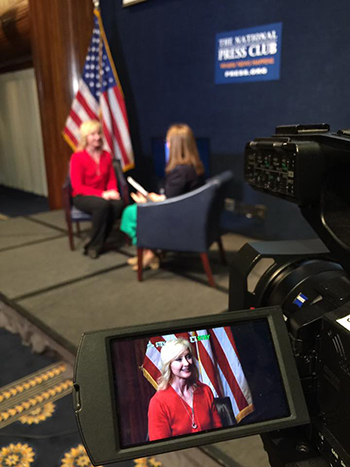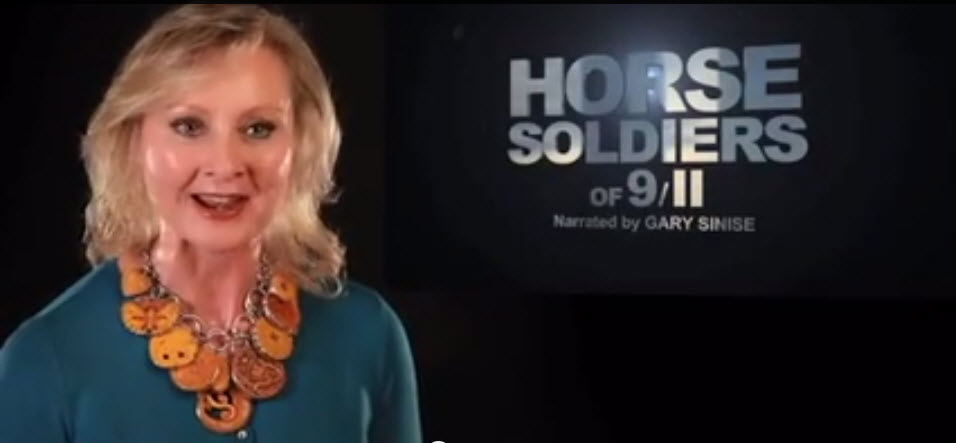By University of Washington, Department of Communications
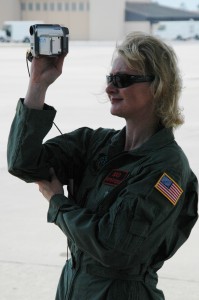
Photos courtesy of Alex Quade
Alex Quade has been covering war zones and hostile environments for 15 years and is the only reporter to have embedded long-term with U.S. Special Operations Forces on combat missions downrange without a crew.
“I’ve gone to the places where other reporters aren’t – the hidden places, the unseen places, inside the special operations world of organized chaos,” Quade said.
She has produced nearly a dozen documentaries and special video series’ about her experiences embedded with every branch of the military and covering the aftermath of natural disasters. Her latest documentary titled “Chinook Down” was announced in Times Square, New York City, and earned her a second National Murrow Award.
“My goal is simple: to make the un-accessible feel relevant to the American people and audience,” Quade said. “The special operators will never leave anyone behind and that’s how I feel about their stories. Their stories should all come home too, so that the truth is not left behind.”
Quade refutes those who say that the definition of a war reporter is merely an adrenaline junkie or thrill-seeker, but rather someone who can engage the truth – which can’t be found from a TV studio in New York City or an occasional anchor drop-in.
“It’s impressive to me that even after almost 18 years of active-duty service, most of it flying fighter aircraft, Alex Quade has still spent more time deployed to combat zones than I have,” said Air Force Col. Nicole M. E. Malachowski and former Thunderbird team member. “She continues to deploy far away from home to dangerous hot spots, sleeps on the desert sand and eats MREs alongside America’s finest, and literally risks her life to ensure the American (and international) public gets the most straightforward view of our current military action.”
Malachowski added that although Quade would never tell anyone, Quade was injured during a firefight in Iraq, causing her to spend weeks walking with a cane and enduring painful physical therapy, all in the hopes of returning to the front lines.
“If that isn’t an example of someone willing to sacrifice on behalf of her calling, I don’t know what is,” Malachowski said. “That makes her a hero in my book. There are many ways to serve your country; some of us choose to show it by wearing our nation’s uniform and others, like Alex, choose to show it by making sacrifices to accurately tell the story of those who need a voice.”
The Committee to Protect Journalists displays on its website 37 journalists killed in the line of duty in 2013 so far, and Quade said, “yet it’s precisely that risk that makes me want to go back because if we as reporters don’t go back, who will?”
“Much like the soldiers she covers, who look at their service as something greater than themselves and worth dying for, Alex displays the same selfless service for her audiences,” said Lt. Col. Derek P. Jones of the U.S. Army Special Forces. “It is this obvious dedication and willingness to risk everything in the pursuit of powerful and meaningful stories that has earned her the greatest respect among soldiers, sailors, Marines, airmen, and special operators alike.”
Jones and Quade met at Forward Operating Base Warhorse, Baqubah, Iraq in 2007 when he was the commander of the Special Forces Advanced Operations Base in Diyala, the most violent province in Iraq at the time. Quade requested to embed with Jones’ Special Forces company for four months, despite it being the most dangerous area Jones had seen in three tours to Iraq.
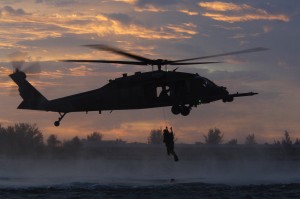
Alex Quade being retrieved in an exercise with 38th Rescue Squadron and Army Special Forces.
Jones referred to Quade as the modern day Joe Galloway, as he recalled her participating in a company raid of over 100 personnel, inserted by helicopter into what they called the “heart of darkness” – an operation even the public affairs officer opted out of.
“Alex has been instrumental in opening otherwise closed doors for reporting on special operations based not on star power, but simply on her incredible courage, candor, intense love of her profession, and most importantly, her desire to not be a burden to the units she covers,” Jones said. “Alex proved to be the atypical reporter, going at it alone and unafraid, just her and her small video camera.”
“This is just one example of the numerous operations Alex participated in – all extremely dangerous, in heat over 115 degrees, wearing body armor and helmet, and yet through it all, Alex always had a smile on her face and her camera rolling or at the ready,” Jones said.
Before becoming a freelance war reporter, Quade worked in television for Fox News and CNN. Former chairman and CEO of CNN, Tom Johnson, said, “She is one of the finest, most courageous journalists of her generation,” which resonated throughout the CNN newsroom.
“She rarely accepts ‘no’ for an answer,” said Eason Jordan, former CNN chief news executive and President of Newsgathering and International Networks. “She’s relentless with bosses and interview subjects alike in getting the answers she seeks. She almost always convinced me to send her on whatever assignment she sought.”
Even before that, her career started at the University of Washington in the Department of Communication. Her very first internship was at KING-5 with chief meteorologist Jeff Renner.
“She was a hard worker with an excellent work ethic and a willingness to go well above and beyond, seeking ways to contribute to make my work more productive,” Renner said.
Quade has returned to campus on occasion to mentor students that are at the beginning stages of their own careers in the field of communication.
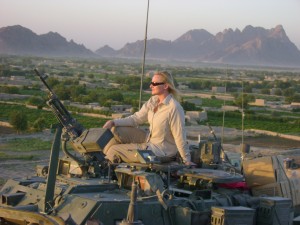
Alex Quade
“You have an amazing purpose on this earth and you can’t let fear get in the way,” she said. “Don’t think you must by invited to succeed; find your own voice and courageously go after what you really want to do.”
In Quade’s case, as a woman living in and covering a male-dominated world of military special operations, she said she has figured out how to remain “me” and have her voice be heard.
She said, “It was a choice to suck it up and soldier on.”
Alex Quade is a 2013 inductee to the University of Washington Communication Alumni Hall of Fame. This article first appeared University of Washington’s communications department.


